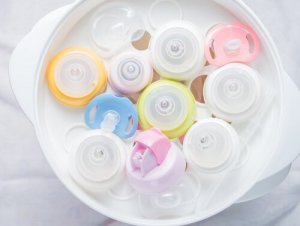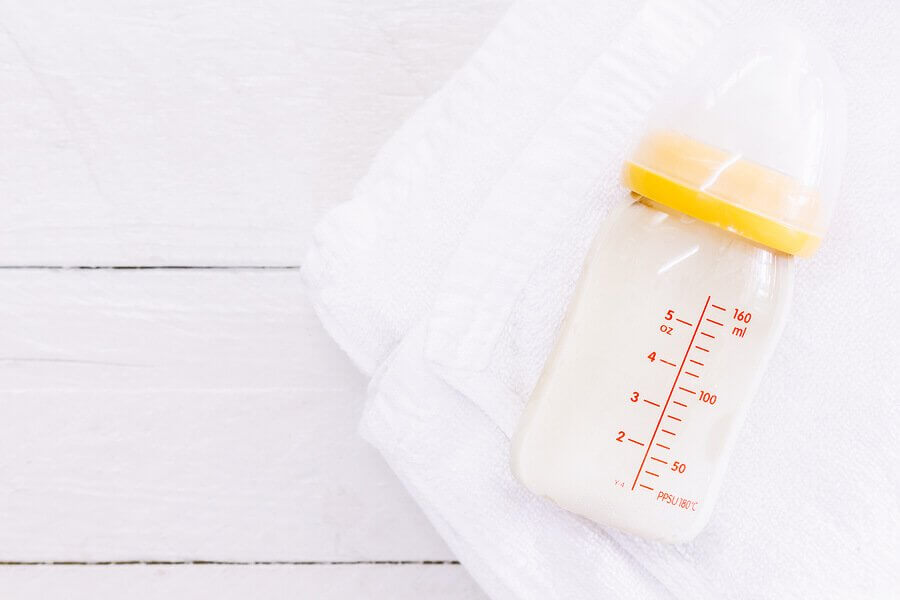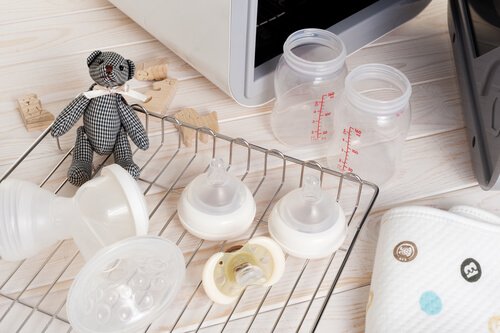Why It's Important to Sterilize Baby Bottles

From the moment they’re born, babies are exposed to microbes and bacteria that threaten their health. This is especially true when we’re talking about what they put in their mouthes. That’s why it’s so important to sterilize baby bottles.
For years, this has been one of the most controversial discussions. Many people believe it’s necessary to keep everything clean and sanitized for their baby. However, others think their baby needs to build immunity.
The truth is, newborns’ immunity level is at zero. Therefore, parents need to make sure everything around their baby is clean. That way, they can prevent diseases and infections.
Recommendations to sterilize baby bottles
In fact, it’s good to sterilize baby bottles before their first use. Additionally, you should also sterilize the pacifiers and nipples. There are different techniques that will all give you the same result, such as:
- Wash it in the dishwasher at a temperature higher than 80 or 90 degrees.
- Boil it in water for 12 or 20 minutes.
- Put it in an electric sterilizer for 5 of 6 minutes.
- Put it in the microwave in a non-metallic container with water for 6 minutes.
- Immerse it in a sanitizing chemical solution for 30 minutes. Be careful and make sure to follow the recommended amounts.
It’s very important to take into consideration what the bottles are made of. That way, you can figure out how long it takes to sterilize them. If you do it for too long, you could damage the bottles.

Steps to sterilize baby bottles
Now that you know the different ways to sterilize baby bottles, you need to follow these three fundamental steps to sterilize them properly:
- First: Before disinfecting them, you must wash the bottles and nipples with plenty of soap and water. To do this, use a long brush to reach all of the nooks and crannies. Then, rinse it very well to avoid leaving residue.
- Second: After thoroughly washing them, let them drain well. We don’t recommend drying them with a kitchen cloth. They usually have a lot of germs that could contaminate what you just sterilized.
- Third: Finally, after they’re dry, place them in the sterilizer that you choose. It’s very important that they aren’t wet before sterilizing them.
After carrying out these steps, we recommend using a sealed container that’s just for baby bottles. That way, they won’t get dusty, and they’ll last for much longer.
Also, keep in mind that it’s not necessary to sterilize baby bottles more than once per day. Once is enough.

How long to sterilize baby bottles
Why is it good to sterilize baby bottles? When should you stop doing it? The answer, although some don’t like it, is “until it’s necessary.”
It’s best to do it until babies start eating solid food. For some parents this can get tedious, but it prevents lots of health problems in babies.
Once your baby stops using bottles, it’ll be enough to just clean whatever he uses to eat. Then, you can just use a brush or specific scrubber.
In addition, you should also frequently clean teething biscuits and anything the babies use to relieve pain when they start teething. They tend to bite everything they see and anything they have in their hands.
While it’s true that you can’t sanitize your entire home, try to keep it as hygienic as possible. After a few months of life when your baby has a stronger immune system, he’ll be much less likely to catch diseases.
Also, remember that all babies are different. Your pediatrician will always be the best person to tell you what’s best for your baby at all times.
From the moment they’re born, babies are exposed to microbes and bacteria that threaten their health. This is especially true when we’re talking about what they put in their mouthes. That’s why it’s so important to sterilize baby bottles.
For years, this has been one of the most controversial discussions. Many people believe it’s necessary to keep everything clean and sanitized for their baby. However, others think their baby needs to build immunity.
The truth is, newborns’ immunity level is at zero. Therefore, parents need to make sure everything around their baby is clean. That way, they can prevent diseases and infections.
Recommendations to sterilize baby bottles
In fact, it’s good to sterilize baby bottles before their first use. Additionally, you should also sterilize the pacifiers and nipples. There are different techniques that will all give you the same result, such as:
- Wash it in the dishwasher at a temperature higher than 80 or 90 degrees.
- Boil it in water for 12 or 20 minutes.
- Put it in an electric sterilizer for 5 of 6 minutes.
- Put it in the microwave in a non-metallic container with water for 6 minutes.
- Immerse it in a sanitizing chemical solution for 30 minutes. Be careful and make sure to follow the recommended amounts.
It’s very important to take into consideration what the bottles are made of. That way, you can figure out how long it takes to sterilize them. If you do it for too long, you could damage the bottles.

Steps to sterilize baby bottles
Now that you know the different ways to sterilize baby bottles, you need to follow these three fundamental steps to sterilize them properly:
- First: Before disinfecting them, you must wash the bottles and nipples with plenty of soap and water. To do this, use a long brush to reach all of the nooks and crannies. Then, rinse it very well to avoid leaving residue.
- Second: After thoroughly washing them, let them drain well. We don’t recommend drying them with a kitchen cloth. They usually have a lot of germs that could contaminate what you just sterilized.
- Third: Finally, after they’re dry, place them in the sterilizer that you choose. It’s very important that they aren’t wet before sterilizing them.
After carrying out these steps, we recommend using a sealed container that’s just for baby bottles. That way, they won’t get dusty, and they’ll last for much longer.
Also, keep in mind that it’s not necessary to sterilize baby bottles more than once per day. Once is enough.

How long to sterilize baby bottles
Why is it good to sterilize baby bottles? When should you stop doing it? The answer, although some don’t like it, is “until it’s necessary.”
It’s best to do it until babies start eating solid food. For some parents this can get tedious, but it prevents lots of health problems in babies.
Once your baby stops using bottles, it’ll be enough to just clean whatever he uses to eat. Then, you can just use a brush or specific scrubber.
In addition, you should also frequently clean teething biscuits and anything the babies use to relieve pain when they start teething. They tend to bite everything they see and anything they have in their hands.
While it’s true that you can’t sanitize your entire home, try to keep it as hygienic as possible. After a few months of life when your baby has a stronger immune system, he’ll be much less likely to catch diseases.
Also, remember that all babies are different. Your pediatrician will always be the best person to tell you what’s best for your baby at all times.
All cited sources were thoroughly reviewed by our team to ensure their quality, reliability, currency, and validity. The bibliography of this article was considered reliable and of academic or scientific accuracy.
- Renfrew M, McLoughlin M, Mcfadden A. Cleaning and Sterilisation of Infant Feeding Equipment: A Systematic Review. Vol 11.; 2008. doi:10.1017/S1368980008001791
- Fact sheet: Bottle-feeding- cleaning and sterilising equipment. Women’s & Newborn Health. Westmead Hospital. [Online].
This text is provided for informational purposes only and does not replace consultation with a professional. If in doubt, consult your specialist.








